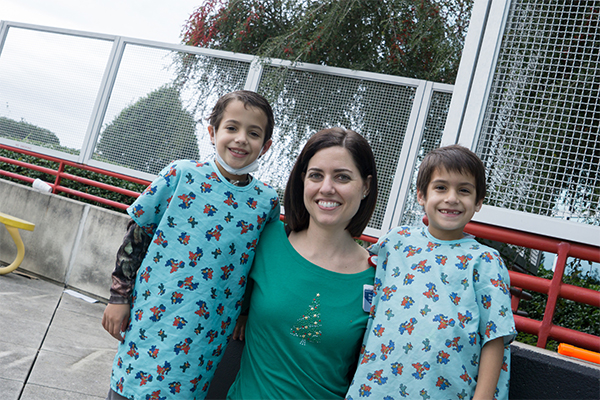March is Child Life Month, and that means acknowledging, celebrating and honoring the dedicated efforts of child life specialists.
Mandy Lee is a child life specialist in the General Pediatric Inpatient Unit at Children’s Hospital of Georgia.
“Child life specialists support patients and families in so many different capacities,” Lee said. “I use play, which is the language of a child, to educate them about the hospital, to normalize their surroundings and to help them cope more effectively, which enables them to have a more positive experience.”
Children’s Hospital of Georgia is proud to offer pediatric patients and their families the services of child and adolescent life specialists. Child and adolescent life specialists are professionals educated in child development and skilled in working with hospitalized children and their families. They use medical play, coping techniques and playroom interaction to help make hospitalized children comfortable and content. Additionally, child life specialists provide distraction techniques and support through stressful procedures.
The American Academy of Pediatrics states that, “child life programs are an important component of pediatric hospital-based care to address the psychosocial concerns that accompany hospitalization and other health care experiences.”
According to the AAP, “It is estimated that 50 to 75 percent of children develop significant fear and anxiety before surgery, with recognized risk factors such as age, temperament, baseline anxiety, past medical encounters and parents’ level of anxiety.”
Lee said making connections with the patients and their families to help reduce that fear and anxiety is the focus of her job. She said all members of the family are invited and encouraged to participate in child life activities. She typically interacts with 15-20 patients a day.
“No one wants to be in the hospital, and the hospital can be a very scary place for a child,” Lee said. “I strive to make the children’s days a little easier by helping them understand and cope with painful procedures and supporting families by walking alongside them as they learn to navigate new diagnoses.”
Lee said the hospital embraces the support services the specialists have to offer. All staff work together to create a positive atmosphere that is focused on taking care of the patients and families the hospital serves. Child life specialists are available seven days a week and sometimes assist chronically ill children in their return to school.
“Sometimes if it’s a chronic patient, for example, an oncology patient who is returning to school,” Lee said, “then we can go and talk to their class to explain their disease, where they’ve been and any physical difference that they may see in the patient.”
According to the AAP financial pressures in many hospitals have threatened the growth and sustainability of child life specialist programs.
“Children’s Hospital of Georgia is the only hospital in our area that is comprised of a specialized medical staff dedicated solely to pediatrics,” Lee said. “The hospital greatly values child life services and strives to not only maintain our program but to also help us grow.”
Whether it is throwing a birthday party for a hospitalized child, supporting a family through loss or traumatic injury or distracting a child during a difficult procedure, Mandy Lee is committed to creating as much of a positive experience as she can for pediatric patients and their families.
“I found out about child life and instantly knew it was what I was supposed to be doing,” Lee said.
At the end of each day, she hopes she has made a positive difference for the patients and families she has served. Besides patient and family interaction, Lee coordinates the kids’ advisory council and assists in children’s camps and special events. She said even when she is away from the patients, she is always close by and available for them.
“We are divided up by unit, so we cover general pediatric inpatient, epilepsy, PIMCU, surgery, hematology/oncology, outpatient clinics, ER and PICU. One child life specialist will see patients and families on that unit,” Lee said. “A patient and family can request us by telling their nurse/doctor, who can then page us.”




